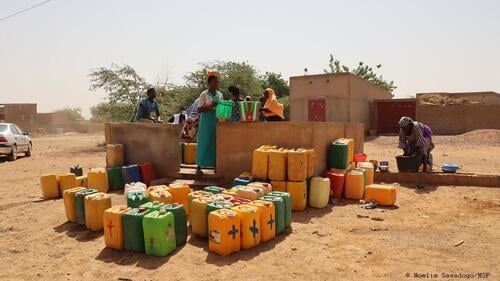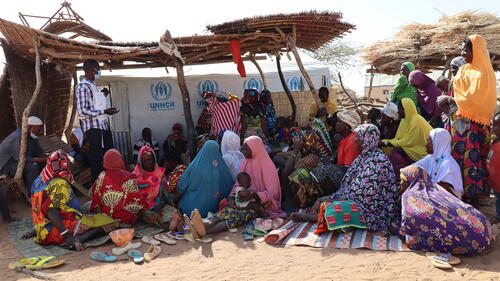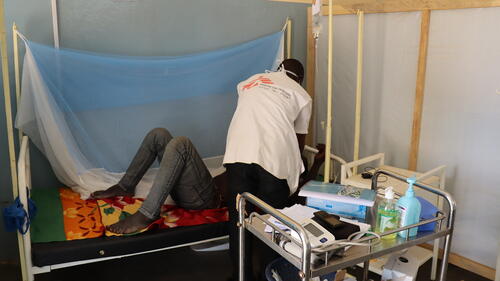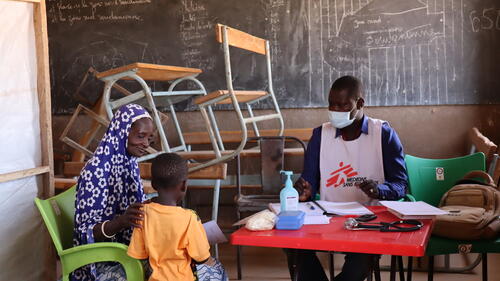The desert region of Sahel, in the north of Burkina Faso, is the driest and hottest part in the country. Since 2018, this region has been at the centre of a growing armed conflict, which has engulfed much of the greater African Sahel that covers also the neighbouring countries. As a result, many communities in this region are in need of humanitarian assistance. Violence and climate change have left people without water and at great risk of disease.
Aïssé Ouedraogo arrived at the water point, a few kilometres from her home, at four in the morning. Six hours later, she has barely filled 10 jerry cans with clean water, each of them carrying just 20 litres.
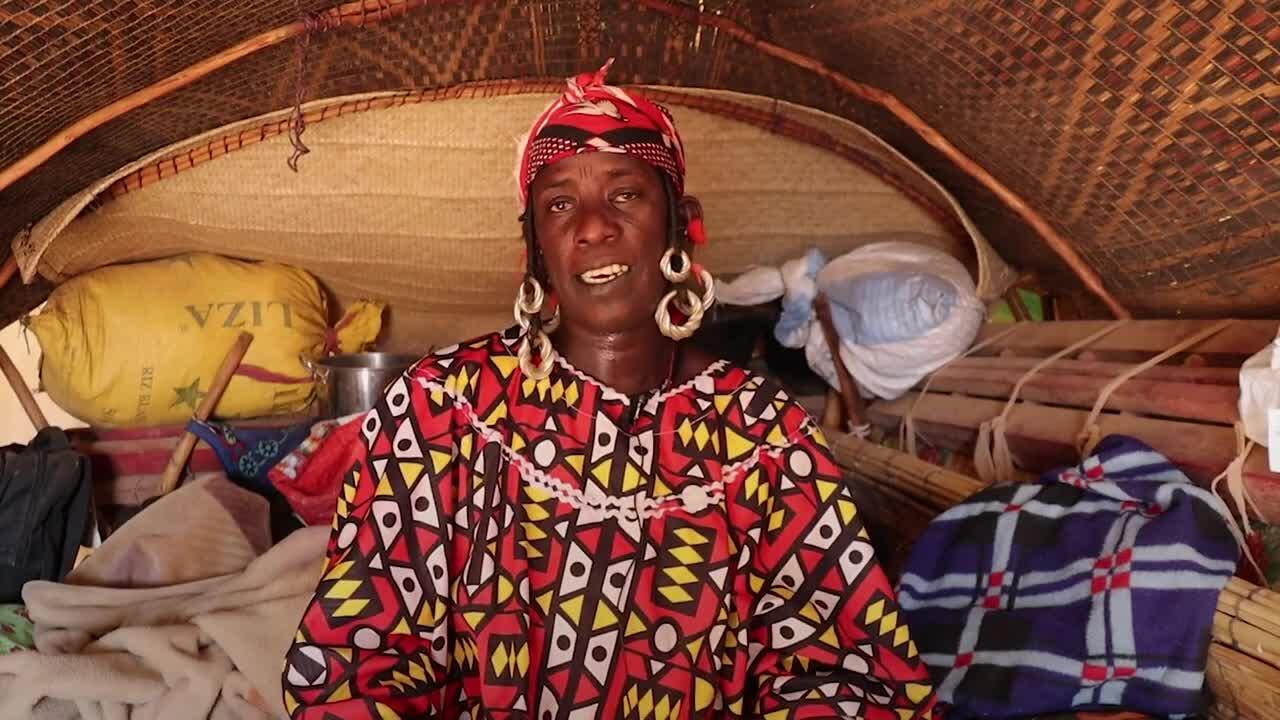
Conflict in Burkina Faso: when the whole day is devoted to fetching water
“I can't take more than that,” says Aïssé. “There is not enough water in this region, and if I take more than I need, the others will not have enough water.”
At this water point in the district of Gorom Gorom, dozens of women like Aïssé wait each day for their turn to fill their jerry cans with clean water. Aïssé fled to Gorom Gorom because of violence in her village of Boulékessi, 85 kilometres away. Displaced people use this water point for their daily needs, such as cooking and domestic work.
The long wait to fetch water, as well as the distance between the water point and their place of residence are among the main difficulties for many displaced people.
“If we can't find water, we have to buy it and one jerry can cost 100 FCFA [€0.15],” says Aïssé. “Sometimes we don't have a choice and it is very difficult for us.”
Displaced people do not have regular access to work and, when they do, they work as daily labourers, earning very little money.
A greater presence of humanitarian organisations is necessary to meet the growing medical and humanitarian needs of people heavily affected by conflict.Youssouf Aly Dembélé, MSF’s head of mission in Burkina Faso
A worsening humanitarian crisis
Since 2018, the Sahel has been plagued by continuous violence between various armed groups and the Burkinabé armed forces, and between the armed groups themselves. This has created a serious humanitarian crisis, with large-scale population movements and the arrival of refugees from neighbouring Niger and Mali.
Over 350,000 people are currently displaced in the Sahel,<a href="https://www.humanitarianresponse.info/en/operations/burkina-faso/infographic/burkina-faso-situation-des-personnes-d%C3%A9plac%C3%A9es-internes-pdis-au">Humanitarian Response</a> around a third of the region's total population, and 628,000 people are in need of assistance for water, hygiene and sanitation. In both the areas with ongoing violence and those hosting thousands of displaced people, access to basic services is a big challenge and the health risks are enormous.
Before the conflict, the region had already experienced strong seasonal climatic variations that had put pressure on its limited water resources. According to the UN Water, Hygiene and Sanitation humanitarian sector group,<a href="https://www.humanitarianresponse.info/fr/operations/burkina-faso/water-sanitation-hygiene">Humanitarian Response</a> around 92,000 people are in need of assistance in the Gorom Gorom district.
Guènèba Hamidou, 49, also arrived at the same water point early in the morning. Also from Boulékéssi, she fled her village in 2019 following deadly attacks.
“Life is not at all easy here. Since we arrived at Gorom Gorom, the water problem has worsened,” says Guènèba. “Food and water are insufficient, and it is difficult to get them. The days when I go home with empty jerry cans, I have nothing to use for cooking.”
Lack of clean water: a source of disease
During the rainy season, which begins in June, access to water becomes easier, but using this water for cooking or drinking comes with its own dangers. The lack of clean water and the high concentration of people are the source of several parasitic infections, skin diseases and water-borne diseases, such as diarrhoea. Reflecting this, providing safe water and functioning sanitation is a fundamental part of the work of Médecins Sans Frontières (MSF) in Burkina Faso.
“We receive hundreds of patients each month in the health centres that we support because of diseases that are the result of poor water quality,” says David Munganga, MSF’s medical coordinator.
Between January and March 2021, MSF received more than 1,200 children aged five and under suffering from diarrhoea, just in our clinics in Dori and Gorom Gorom.
Since we arrived at Gorom Gorom, the water problem has worsened...The days when I go home with empty jerry cans, I have nothing to use for cooking.Guènèba Hamidou, displaced person
In Gorom Gorom district, MSF teams recently built a new borehole to increase access to clean water on a site that serves more than 20,000 displaced people. This borehole can provide 1,100 litres of water per hour and complements seven other boreholes that the teams have repaired in the area.
In this district, MSF supports the Gorom Gorom district hospital and two other health centres. Our teams also distribute hygiene kits to newly displaced people, including soap, jerry cans and water disinfection tablets for household water sanitation. Health promoters regularly visit displaced communities to educate and raise awareness about health and hygiene-related issues.
“Access to water and basic services for displaced people and local communities in the Sahel region, and in many places in Burkina Faso, is a real challenge,” says Youssouf Aly Dembélé, MSF’s head of mission in Burkina Faso. “A greater presence of humanitarian organisations is necessary to meet the growing medical and humanitarian needs of people heavily affected by conflict."
Six out of the 13 regions in Burkina Faso are affected by the water crisis: Sahel, Centre-Nord, Nord, Est, Boucle du Mouhoun and Centre-Est. MSF is working in four of these to bring water to people in need. In 2020, MSF teams distributed approximately 133,934,000 litres of water, an amount equivalent to 45 Olympic-sized swimming pools. MSF currently provides medical and humanitarian assistance to local communities and displaced people in Burkina Faso. Services include free basic and specialist healthcare, vaccination campaigns and the distribution of relief items. In 2020, more than 478,000 medical consultations were carried out.



